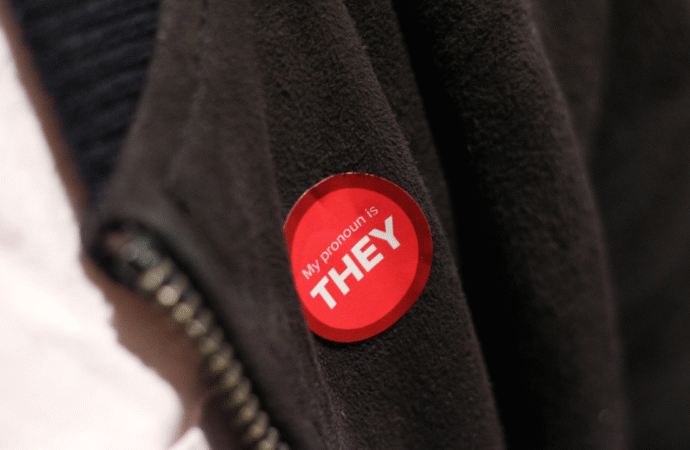Many years ago, my elementary school teachers taught that a pronoun must match its antecedent – the noun to which it refers – in number, gender, and person. In “John read that rule from his book,” the pronoun “his” is singular, masculine, and third-person. That’s straight-up grammar.
Yet every week I read online writers who employ the plural “they” to refer to a singular person. Sometimes sloppy writing or ignorance is the cause of this misuse. An example: “Someone in Congress needs to address the skyrocketing national debt, and they need to do it immediately.” Someone is a singular noun and demands a singular pronoun. This mistake is easily corrected, however, by changing “someone” to “some members.”
On other occasions, the writer clearly intends this erroneous usage, notably in the use of the pronouns “they” and “their.” In her recent Substack essay, “Exploring the Fruit of Gentleness,” Freda Donnelly included a paragraph about an intern she’d taken under her wing who had botched an assignment. Here is a sampling of that paragraph:
The intern had trusted me with personal things, as I’d become a mentor of sorts to them since I was a manager at this organization. I knew they had reason to be distracted. However, I didn’t want to even appear to be throwing this back at them … I factually and straightforwardly shared my findings with them and inquired as to what happened. They didn’t know and were frazzled to find out that it was incorrect.
Two sentences later, Donnelly lets slips this third-person plural mask when she writes, “More importantly than that, I didn’t want to take away her dignity, especially at a vulnerable time, nor did I sour her experience.”
With that exposure of the intern’s gender, some questions arise. First, why was Donnelly using “they,” “them,” and “their” in the first place? Was she trying to conceal the intern’s identity to avoid bringing shame to her, but then forgot to continue the charade? Or had the intern, fuzzy on the question of gender, asked to be addressed in the third-person plural? In either case, Donnelly’s reversion to the correct pronouns at the end of the paragraph indicates she could only keep up the pretense for so long before instinct and reason took the helm.
Recently, I interviewed an entertainment planner for a large brewery in Asheville, N.C. On her bio she listed her “preferred pronouns” as “they/them.” In her case, the motive was clear. She wished to march under the whimsical banner of transgenderism and sexual fluidity.
This grammatical hocus-pocus may seem harmless, but there are ramifications. If a new acquaintance, Allen, tells me he prefers to be addressed with the pronoun they, as in “Allen’s gone to the ball game. They were really excited,” then I cannot help but see Allen as possessed of multiple personalities or Dissociative Identity Disorder. I’m left wondering what other characters lie tangled up inside him.
Furthermore, this buffet of pronouns will confuse readers. Here’s a sample of the mess this can create:
“On his way home from work, Richard picked up the clementines their wife wanted. When they got home, they squeezed them and declared them perfect. Later that evening, while watching television, they ate two oranges while they sipped a beer and munched on crackers.”
Here’s the translation:
“On his way home from work, Richard picked up the clementines his wife wanted. When he got home, she squeezed them and declared them perfect. Later that evening, while watching television, she ate two oranges while he sipped a beer and munched on crackers.”
Preferred pronouns are just one more example of the political and cultural obfuscations of our language. Not only are these twisted constructions grammatically incorrect and jarring, they also defy common sense and the laws of nature and science.
It’s time we closed the curtain on this wrongheaded notion and moved on.
—
The republication of this article is made possible by The Fred & Rheta Skelton Center for Cultural Renewal.
Image Credit: Flickr-gdsteam, CC BY 2.0
35 comments















35 Comments
Angel
October 4, 2025, 1:50 amI get paid over 220 Dollars per hour working from home with 2 kids at home. i never thought i’d be able to do it but my best friend earns over 15k a month doing this and she convinced me to try. it was all true and has totally changed my life. This is what I do, check it out by Visiting Following Website…
REPLY.
.
HERE—————⊃⫸ https://Www.Cash43.Com
RSLewis@Angel
October 4, 2025, 1:50 amGoogle is now paying $300 to $500 per hour for doing work online work from home. Last paycheck of me said that $20537 from this easy and simple job. Its amazing and earns are awesome. No boss, full time freedom and earnings are in front of you. This job is just awesome. Every person can makes income online with google easily….
REPLY.
More Details For Us→→ http://Www.Payathome9.Com
FlynnPerrier@RSLewis
October 4, 2025, 1:51 am.
.
.
.
.
.
.
.
.
.
.
.
.
.
.
.
.
.
.
..
.
.
.
REPLY.
.
.
.
.
.
.
.
.
.
.
.
..
RoyVWarren@RSLewis
October 4, 2025, 6:22 amI get paid more than $120 to $130 per hour for working online. I heard about this job 3 months ago and after joining this i have earned easily $15k from this without having online working skills. This is what I do…….Www.Works6.Com
REPLYDavid McGraw@RSLewis
October 4, 2025, 3:10 pmJoin this online home job right now and start making more than $500 every single day. It’s easy work—if you know how to use Facebook, then this job is for you. No boss watching over you, and you can work whenever you want from home. I made $18,632 last month by doing this just 2 hours a day after college. Curious to know more or join? Just visit this website for details.
Open This→→→→ http://Www.Work99.Site
REPLYJuliya@Angel
October 7, 2025, 3:07 pmMy last pay check was $9500 working 12 hours a week online. My sisters friend has been averaging 15k for months now and she works about 20 hours a week. I can't believe how easy it was once I tried it out.
This is what I do… http://Www.Work99.Site
REPLYNatalie Martin
October 4, 2025, 5:36 amJust started this 3 weeks ago, and I already received my first check of $3,677 — pretty cool! It’s not a get-rich-quick thing, but if you can use a computer and internet and give some time each day, you can totally do this too. I was honestly surprised how real and simple it turned out to be.
REPLYjust check.…………> https://Www.Homeprofit1.site
JaneMSeidman
October 4, 2025, 6:44 amI get paid more than $90 to $120 per hour for working online. I heard about this job 3 months ago, and after joining this, I have earned easily $20k from this without having online working skills. Simply give it a shot on the accompanying site…
Here is I started.…………>> http://www.work43.marketing
REPLYrolev
October 4, 2025, 6:54 amI get paid over $130 1 to 3 hours working from home with 2 kids at home. I never thought I’d be able to do it but my best friend earns over $27k a month doing this and she convinced me to try. The potential with this is endless.
REPLYHeress——-> http://www.now.jobs67.com
Wendy Taylor
October 4, 2025, 9:20 pmMy name is Wendy Taylor, I'm from Los Angeles, i want to announce to you Viewer how Capital Crypto Recover help me to restore my Lost Bitcoin, I invested with a Crypto broker without proper research to know what I was hoarding my hard-earned money into scammers, i lost access to my crypto wallet or had your funds stolen? Don’t worry Capital Crypto Recover is here to help you recover your cryptocurrency with cutting-edge technical expertise, With years of experience in the crypto world, Capital Crypto Recover employs the best latest tools and ethical hacking techniques to help you recover lost assets, unlock hacked accounts, Whether it’s a forgotten password, Capital Crypto Recover has the expertise to help you get your crypto back. a security company service that has a 100% success rate in the recovery of crypto assets, i lost wallet and hacked accounts. I provided them the information they requested and they began their investigation. To my surprise, Capital Crypto Recover was able to trace and recover my crypto assets successfully within 24hours. Thank you for your service in helping me recover my $647,734 worth of crypto funds and I highly recommend their recovery services, they are reliable and a trusted company to any individuals looking to recover lost money. Contact email [email protected] OR Telegram @Capitalcryptorecover Call/Text Number +1 (336)390-6684 his contact: [email protected] His website: https://recovercapital.wixsite.com/capital-crypto-rec-1
REPLYCassandraJHarris@Wendy Taylor
October 6, 2025, 2:22 amStart making cash right now… Get more time with your family by doing jobs that only require for you to have a computer and an internet access and you can have that at your home. Start bringing up to $2700-$5700+Dollar per week . I've started this job and I've never been happier and now I am sharing it with you, so you can try it too. You can check it out here…
REPLYHere is I started_______ https://Www.Salary7.Zone
CassandraJHarris@Wendy Taylor
October 6, 2025, 2:27 amStart making cash right now… Get more time with your family by doing jobs that only require for you to have a computer and an internet access and you can have that at your home. Start bringing up to $2700-$5700+Dollar per week . I've started this job and I've never been happier and now I am sharing it with you, so you can try it too. You can check it out here…
REPLYHere is I started_______ https://Www.Salary7.Zone